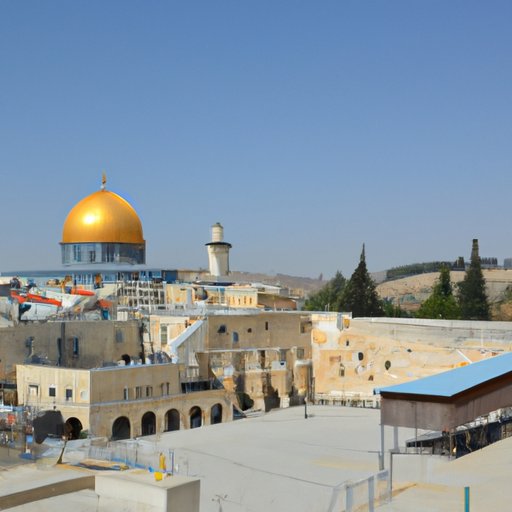Introduction
Jerusalem is considered one of the most sacred cities in the world, and it holds high religious and spiritual significance to many people, particularly Muslims. In this article, we will explore why Jerusalem is important to Muslims. Understanding the significance and history of Jerusalem to Muslims is critical to have a nuanced understanding of Islamic faith and its followers.
Jerusalem’s significance to Muslims: A historical perspective
Jerusalem’s historical context is one of the oldest and most diverse in the world. The city has been at the center of several significant historical and religious events and has been ruled by various empires over time. However, it is the Islamic faith that made Jerusalem a significant spiritual center.
The Islamic faith has connections with Jerusalem that can be traced all the way back to Prophet Muhammad’s time. Jerusalem is home to some of the most important sites to the Muslim faith, including the Al-Aqsa Mosque and the Dome of the Rock. Muslims consider these sites as the first Qibla. A Qibla is a point towards which Muslims face while offering prayers. Initially, the Qibla was set towards Al-Aqsa Mosque in Jerusalem, until it was changed to Mecca after the Hijrah (Prophet Mohammad’s migration from Mecca to Medina).
Moreover, Prophet Mohammad’s Isra and Miraj, a significant event in Islamic history where the Prophet traveled to Jerusalem and ascended to heaven, cemented the city’s importance in the Islamic faith. The Al-Aqsa Mosque represents the spot where the Prophet prayed before his journey to heaven.
Exploring the religious and spiritual importance of Jerusalem to the Islamic faith
Jerusalem holds immense religious significance in Islamic teachings and the Quran. One of the chapters in the Quran, Surah Al-Isra, is named after Prophet Mohammad’s miraculous journey to Jerusalem. Additionally, the Quran mentions the significance of the city in verse 1 of Chapter 17:
“Exalted is He who took His Servant by night from al-Masjid al-Haram to al-Masjid al-Aqsa, whose surroundings We have blessed, to show him of Our signs. Indeed, He is the Hearing, the Seeing.”
For Muslims, Jerusalem is considered the third holiest site after Mecca and Medina. The significance of Jerusalem in Islamic faith is multi-layered and diverse. Muslims believe that visiting and praying in these sites holds immense spiritual reward and is also a sign of devotion and dedication to their faith.
The political implications of Jerusalem for Muslims: past, present, and future
Jerusalem has had significant political implications for Muslim communities throughout history. Muslim rulers controlled Jerusalem for centuries, and the city became a center of political and spiritual power. Because of this, control of Jerusalem was coveted by many empires, including Christians during the Crusades, leading to numerous battles for control of the city.
Presently, Israel controls East Jerusalem and the holy sites. No Muslim-majority country recognizes Israel’s control over this area. The current situation has resulted in various conflicts, leading to strains in the Muslim and Jewish relationship. The Jerusalem issue remains a sensitive topic in the Middle East and an essential part of the broader Arab-Israeli conflict.
Understanding the pilgrimage to Jerusalem: A Muslim’s journey to the holy city
The pilgrimage to Jerusalem, also known as the Hajj, is a vital part of the Islamic faith. The Hajj is an annual Islamic pilgrimage to Mecca in Saudi Arabia. Muslims are expected to participate in the Hajj at least once in their lifetime if they can afford it. However, for Muslims, visiting other holy sites, including Jerusalem, is also significant.
During the pilgrimage, Muslims visit Jerusalem, perform various rituals, and pray in the Al-Aqsa Mosque. The pilgrimage to Jerusalem is emotionally and spiritually fulfilling for Muslims, who believe that visiting these holy sites serve as a reminder of their faith and devotion.
The relationship between Jerusalem and the Islamic identity: A closer look at the Muslim connection to the Holy Land
Jerusalem is more than just a holy city to Muslims. It serves as a symbol of their faith and plays a critical role in building and reinforcing their identity as Muslims. Many Muslims feel an emotional connection to Jerusalem, which represents their faith’s history, struggles, and triumphs.
Jerusalem’s importance to Muslims goes beyond religion and spirituality. It has cultural significance as well. Art, literature, music, and food all play a role in expressing the Muslim connection to the Holy Land. Muslim cultural practices are heavily influenced by the city, and its local traditions often carry religious significance.
Conclusion
Jerusalem’s importance to Muslims is multifaceted and deep-rooted. The city’s history, spiritual significance, and cultural importance have contributed to its position as one of the most sacred cities in the world. Understanding the city’s importance to Muslims is essential to cultivate meaningful relationships with Muslim communities and have a nuanced understanding of the Islamic faith and its followers.
For readers who want to explore this topic further, there are several resources online.
